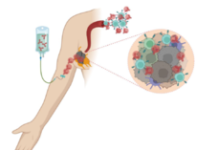Stephanie Poisson is undergoing chemotherapy for early-stage breast cancer. In the midst of the COVID-19 crisis, however, she’s had no choice but to delay treatment because her husband, BJ, has tested positive for the disease.She underwent a lumpectomy in January, and has been undergoing chemo to rid her body of the last of her cancer. But her husband’s diagnosis means she has been exposed to the virus, too.“I’m supposed to have another round in the next week, and I haven’t even been back because I’ve been exposed,” Poisson said.Poisson and her husband are staying on separate floors of the house until she gets the results from her own coronavirus test. Adding to her frustration is the wait time for results, which is notoriously long at this point. BJ’s results took nine days to come in. Photo: Twitter/Michael Seiden
Photo: Twitter/Michael Seiden
Health professionals in every field have had to pivot and alter how they provide care. Poisson had to delay her own treatment because of her husband’s illness, but that’s not the only problem facing cancer patients. Many are finding that their surgeries are delayed if they have early-stage or slow-growing cancers because they’re considered “elective” because they’re not immediately life-threatening. Even patients with aggressive or metastatic breast cancer are dealing with altered treatment plans.Others are finding appointments cancelled or pushed back if the facility is small and staff members and medical personnel have been infected with the virus.“We are going to face ethical dilemmas, not just in cancer care but in medical care in general,” said Dr. Len Lichtenfeld of the American Cancer Society. “We recognize that any delay is not good but we may not have a choice.” Photo: Adobe Stock/Kiryl Lis
Photo: Adobe Stock/Kiryl Lis
Dr. David Byrd, who’s a surgeon at the University of Washington in Seattle, said that women who have breast cancer in an early stage that’s also fueled by estrogen could delay surgery and try hormone therapy first. This way, the cancer is still being treated, just perhaps not as rigorously as originally intended. It could buy some extra time until the COVID-19 crisis slows and the risk isn’t as great. For chemotherapy patients, some may be able to switch to oral medication instead of going in for IV treatments.“We want to balance the harm of delaying immediate cancer care against the harm of potential COVID infection or possible transmission to other people,” said Dr. Robert Uzzo, the chief of surgery at Fox Chase Cancer Center in Philadelphia. “What people hear about a lot are about ventilators, respirators, personal protective equipment being in short supply, but there also are shortages of blood and other things needed for surgery.” Photo: Adobe Stock/Pixel-Shot
Photo: Adobe Stock/Pixel-Shot
A study of 1,590 COVID-19 cases in China found that cancer patients and cancer survivors face unique risks because of their cancer history. This is because cancer alone can suppress typical immune system functions, and also because cancer treatments like chemo and surgery can leave patients more vulnerable to infections. The study also found that people with a history of cancer who also became infected with COVID-19 had a much higher risk of entering the intensive care unit (ICU) or even dying when compared to patients without a history of cancer.We’re in the midst of a scary and uncertain time. Medical professionals all over the world have to make tough calls about what types of procedures to focus on to keep the most people safe and healthy. Talk to your doctor about any concerns you have. Stay home as often as you can and stay safe.Source









